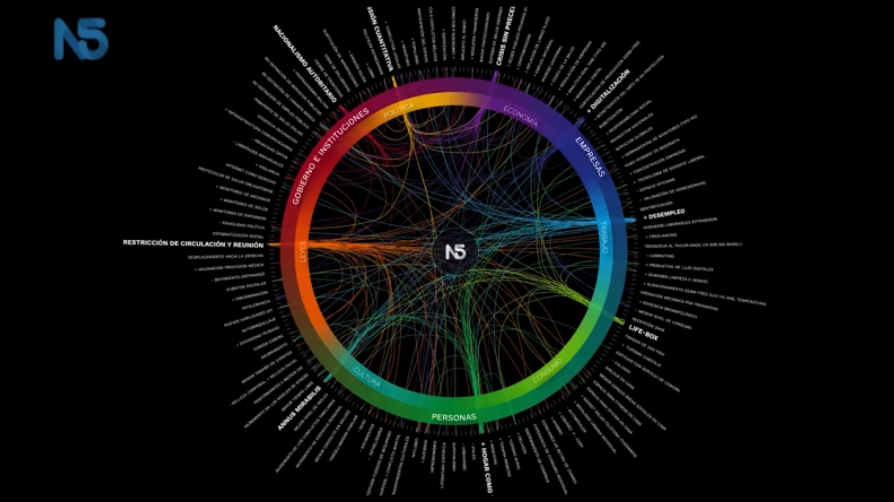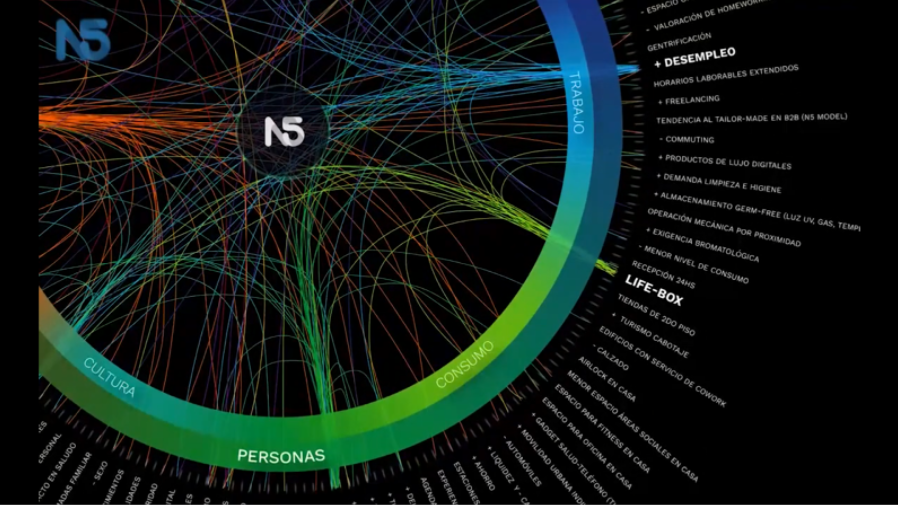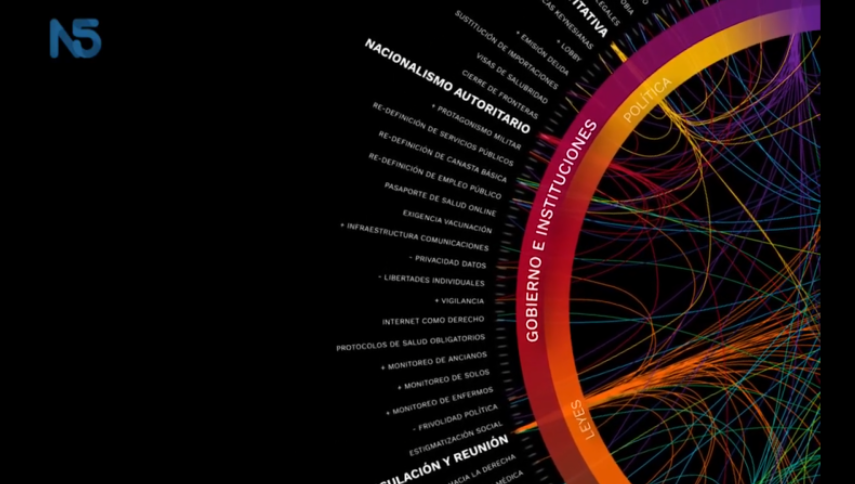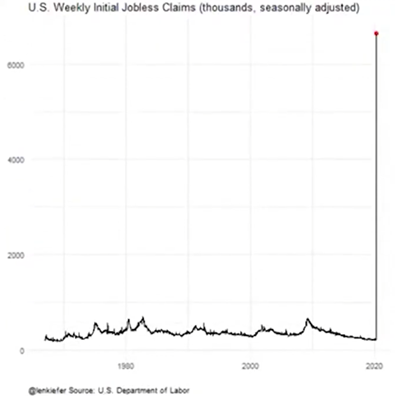Annus Mirabilis: Post-Pandemic Predictions
Annus Mirabilis: Post-Pandemic Predictions
We have heard that times of crisis are times of opportunity. But what will happen after the pandemic? Are we facing a time of discoveries? What does the future look like for banks?
Annus Mirabilis is the result of a study carried out by N5 and managed by different teams of experts around the world. The objective? Understand the impact of the crisis we are still going through and predict the changes it will unleash in the post-pandemic world.
Before diving into these predictions, however, two considerations need to be taken into account.
First Consideration: The World Is Not Linear
If there is one thing that history has proven to us time and time again, it is that it is impossible to predict the future accurately. No matter how extensive the analyzes are, the world is an environment with virtually infinite variables.
Like billiard balls, when these variables move they also collide with each other, altering the position of the others. It is part of what we know as entropy.
Even the baker on the corner could change the course of history if enough variables line up. Unlikely? Yes, just as unlikely that the spark that set off the Arab Spring was the death of a street vendor. Or that the assassination of an archduke of a small country started a world war.
Second Consideration: Progress Isn’t Linear either
The advancement of humanity is not a process that can be projected. Rather, it is a curvy road.
When it comes to historical advancement, there are three phenomena worth keeping in mind: suspension, absence, and setback.
Suspension: Sometimes knowledge is suspended in time. This is what happened with the discovery of the exact circumference of the earth, before Christ. Thousands of years later, people still believed that the earth was flat.
Absence: Sometimes the advance is simply non-existent. In ancient Egypt, people cut their hair in the same way as today. There was no advance in technology for thousands of years
Retraction: Sometimes the advance goes, in a certain way, backwards. Such is the case with airplane travel times. The first people to fly in airplanes could have imagined a world in which air travel was faster. However, in recent years travel has only stretched.
History is a set of quantum events capable of appearing at any moment. And when they do occur, they can have a disproportionate impact on human history. Such was the case with the invention of vaccines, the printing press, innovations, revolutions, and pandemics.

How Pandemics Have Changed History
If what we want to find out is what will happen after the pandemic, we have to take a look back.
Each of the pandemics that humanity has experienced has had a decisive impact on history. To some we even owe the invention of positive things.
The first is the case of the typhoid fever pandemic, which took place in 430 BC. 33% of the citizens of Athens died. The city ended up falling, leaving a huge power vacuum that would later be used by the Macedonians, and with it Hellenism would also come. In the long run, this would lead to events such as the creation of democracy.
Another case is that of the 1800 yellow fever in Haiti, which wiped out tens of thousands of French who were occupying the country, thus achieving Haitian independence. This put France in a bad position and ended up causing it to sell what was then the Louisiana Territory to the United States. Today that territory is about 50% of the country.
Annus Mirabilis: The Future After the Pandemic
As we mentioned before, the history of humanity is full of variables interacting with each other; moving, changing the course of the others. Therefore, if you want to make an approximation to the future, it is necessary to be exhaustive.
To carry out this research we took into account hundreds of variables, which were grouped according to importance and which are linked to others by cause-effect relationships.
What does this mean? What we analyze are the big changes; axes that act as a domino effect, causing chain reactions.

Home as a Triple Space
During most of humanity and until today, human life developed in three spaces: the home (where you rest), the factory (where you work), and the social space (where everything that is not done is done). can be done in the other two).
However, the pandemic put this model in check, causing these three spaces to occur in the home. This means that now the separation between these spaces is less physical than mental.
As a result of this basic principle, a series of logical reactions are triggered. One of them is a lower amount of traffic, a consequence of which now it is not necessary to travel to work.
Another consequence is the relocation of people from central places to more isolated and accessible places, with the sole condition of having good internet.
This change does not depend on the pandemic. It won’t go away once things get back to “normal”. It is a result that arises as a result of the social experiment that the pandemic brought, and therefore it will endure even after it.
Life-Box
Now you walk and run less. Life takes place almost entirely inside the house. When we socialize we do it through a computer, and we only see ourselves from the torso up.
Because of this, things that we used to give importance to, such as expensive sneakers, are losing value. What good are they if we can’t go out to use them?
Also, it is possible that we express ourselves more through symbols visible from the torso up – tattoos, hair dyes. Things that will be easily evident in video calls.
In the same way, we can predict that the resources to represent status move from the material to the immaterial. Premium subscriptions to messaging apps, for example, for the sole purpose of communicating personal value. People need a way to distinguish themselves in these new environments, and they are willing to pay a premium for it.

Quantitative Expansion
The impact of the pandemic has not only been a health crisis, but also an economic one. All countries have found themselves in an unfavorable position in this regard, be it directly or indirectly.
One of the consequences of this is that the nation states have tried to face this crisis with monetary issuance. However, other nuances also follow from this. For example, the weight that the discourse of a universal salary has had during this time. In some places it has even started.
We can also foresee an increase in import substitution. A context in which physical products become more national but services become more international.
Nationalism and Authoritarianism
Another consequence of the pandemic is the new role of individual freedoms – and the new role of the state in mediating these.
The countries where the pandemic was best contained were where the state was able to have more control over people’s freedom, both in terms of data and physical restrictions. This means that previous notions such as those of freedom, above all, are now confronted by restrictions in pursuit of the common good.
Given this, we can see a strengthening of nationalism and authoritarianism. It is a future in which these measures are seen with better eyes, and in which the power of the state over its population is legitimized. In addition to the distrust that appears before those foreigners who could “bring the virus” to the country.

Digitization
One of the most obvious consequences of the pandemic is the importance that digital media acquired as a result of it. From common online meetings to computer learning and work.
Faced with this breakdown of physical barriers, companies have discovered the potential of hiring employees from abroad: cheaper, capable of doing the same job.
In addition, thanks to digitization, more flexible ways of working have also proliferated. Not surprisingly, self-employed platforms have had a very high growth rate.
Driven by big data, digitization opens the doors to a new world of possibilities in the online environment.
Unemployment
The limitations that emerged in the wake of the pandemic have killed hundreds of millions of jobs around the world. It has been one of the worst years in history in labor matters.
Just take a look at the graph below that shows how unemployment grew in 2020 in the US alone.

That long line that shoots up into the sky is about the unemployment rate.
As you can see, the growth is so high that it reduces the fluctuations of previous years to a minuscule scale.
Public banking
Another of the problems evidenced by the pandemic is the limitations when it comes to reaching an unbanked public. We are talking about people without a bank account who suddenly had to send and receive money online.
That is why it is possible to see the proliferation in the future of a public bank – the state taking charge of solving the banking role.
It will use new information technologies to solve many of the logistical problems that appeared with the pandemic. It is possible that in the future this will translate into the arrival of DNI accounts, which are created when the person is born. These would serve to issue and receive payments, so that all people have a base from which to operate with money online.
This in turn can bring a collaboration between public and private banks, and fintechs.
Another thing that can be seen to arrive is the importance that open banking will acquire, in which people’s data is easier to access. This is naturally a threat to traditional banking, but it also opens the door to new opportunities in which banks can take advantage of open data to provide new and better services to their customers.
One of the strengths of banks is their reputation; the security they transmit. People trust them to save their money, so it stands to reason that they also trust them when it comes to manipulating their data. Banks could take advantage of this to offer unique services, such as conducting business on behalf of clients.
Are you moving and need someone to carry out the paperwork, change the address of your services and update your details? Just send a message to your bank and they will take care of the process.
Flight-to-Quality
What will happen after the pandemic with the banks? One of the ways to begin to understand it is by analyzing the concept of flight-to-quality. This is a process in which clients transfer their deposits from smaller institutions to more reputable ones.
This social phenomenon predominates even more in times of crisis, when people prefer to trust the established and take fewer risks. These large institutions are perceived as too large to cease to exist, and therefore more secure.
At first, this involves people moving from fintechs to established banks. But in a second stage, this could involve people moving from banks to big tech companies.
Bank Producer
Another of the events that we estimate will emerge from the pandemic is the appearance of a figure that is already established in the insurance business but will be new in the banking business: that of the bank producer.
This is a person with good professional performance, usually close to retirement age. Upon retirement, this producer would acquire the distribution license from the bank where he worked all his life and from his home he will dedicate himself to dealing with a portfolio of clients.
We can imagine this producer as someone established and with important clients, thanks to which other banks will also take an interest in him. In the end, this person could end up working with 5 different benches from the terrace of their house.
Analog Death
Digital transformation is a process that began years ago, but has now been greatly accelerated by the pandemic. What at first was a continuous growth has taken a huge leap, leaving the field of analog far behind.
In the long term, the change will be absolute. It is a matter of time before overly manual processes end up being eliminated, and algorithms take over instead.
Banks have long based their contingency systems on humans. After all, for institutions where money is handled the most important thing is the quality of the service – nobody wants to enter their account and see that their money has disappeared.
However, the pandemic has put this model in check. Now, operational continuity is at stake precisely because of its analogue condition, and to perpetrate it, new digital measures are needed.
Annus Mirabilis: The Year of Wonders
Annus Mirabilis is a phrase that comes from the Latin anni mirabiles and means “wonderful year”. Throughout history there have been years in which there have been several discoveries beneficial to humanity.
1543 was the year of science. First, the anatomy masterpiece De humani corporis fabrica was published, which revolutionized the understanding of the human body. And followed by this came The Revolution of the Celestial Bodies, which redefined our knowledge about the stars forever.
In 1666, Isaac Newton at only 23 years old made revolutionary discoveries in the area of ??calculus, motion, optics and gravitation. Curiously, he was able to work on these theories thanks to the break he had at his university due to the appearance of a plague.
In 1905, a 26-year-old Albert Einstein published 4 scientific papers that forever changed physics, each one more revealing than the last. Among them was his famous formula: E = mc².
What we are witnessing is the combination of a multitude of variables, the only thing that can come out of the clash are new and exciting advances.
It is well known that times of change are also times of innovation – necessity sharpens ingenuity, as the saying goes.
Now, with the enormous amount of changes that have taken place, we can forecast a year in which all these variables converge to bring out the most innovative side of society.
This did not happen in 2021, however. It is still too early. The fires started by the pandemic must first be put out. That’s why it’s very possile that our Annus Mirabilis will arrive in 2022 – and we can’t wait to find out what surprises it brings us.
Editorial: Marcelo Frette

